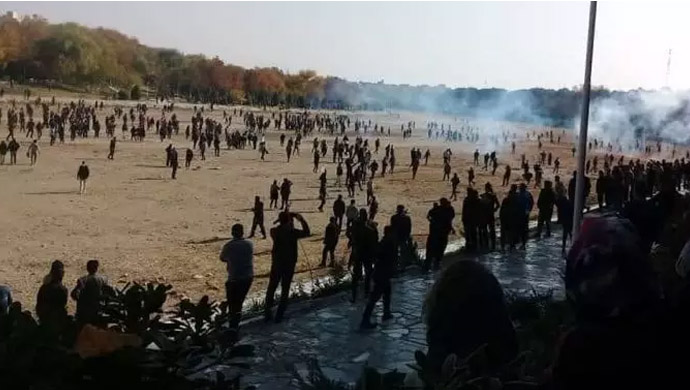The farmers of Isfahan returned to the dried basin of Zayandeh Rud river on Friday to resume their protests to water shortages caused by regime policies.
As the farmers gathered at the Pol-e Khaju area early in the morning, anti-riot forces and bassij militia attacked them with teargas and batons to prevent the demonstrations from taking shape.
The farmers stood their ground and resisted the repressive forces, calling for unity and support from the people of Isfahan.
“We will not go home until water is returned to Zayandeh Rud,” the protesters were chanting on Friday morning.
November 26 – Isfahan, central #Iran
People are gathering at the famous Pole Khaju protest site and regime security forces are firing tear gas to disrupt their peaceful gathering.#IranProtests #اعتراضات_سراسریpic.twitter.com/EdfUqoB02p— People's Mojahedin Organization of Iran (PMOI/MEK) (@Mojahedineng) November 26, 2021
After the attack by security forces, the protesters resisted. They threw rocks at the anti-riot forces and forced them to flee. The protests expanded inside the city of Isfahan, where the protesters also resisted the security forces. A motorcade of repressive forces was stopped by the protesters.
The protesters chanted anti-regime slogans, including “Down with the dictator” and “Down with Khamenei,” calling for the overthrow of regime supreme leader Ali Khamenei.
Mrs. Maryam Rajavi, the president-elect of the National Council of Resistance of Iran (NCRI), expressed support for the protests in Isfahan.
“The mullahs’ religious fascism is the enemy of Isfahan and Zayanderud River,” she said. “It has occupied the country but the people of Iran are determined to liberate their beautiful country.”
The mullahs’ religious fascism is the enemy of Isfahan and Zayanderud River. It has occupied the country but the people of #Iran are determined to liberate their beautiful country. #IranProtests
— Maryam Rajavi (@Maryam_Rajavi) November 26, 2021
Videos coming from Isfahan show security forces directly opening fire on protesters. Several protesters have been injured by security forces. In other areas, anti-riot forces are beating protesters with batons.
Despite the heavy presence of security forces, the people of Isfahan continue to resist in different pockets across the city. The protesters were chanting slogans against Khamenei, the Revolutionary Guards (IRGC), and the Bassij, and calling on all people to unite against the repressive forces of the mullahs’ regime.
On Thursday, after weeks of assembly and sit-ins, the farmers were attacked by security forces early in the morning. The regime’s repressive anti-riot units burned the farmers’ tents, threw teargas in their crowd, and forced them to disperse.
While the security forces were forcibly removing the tents and dispersing the protesters, state media falsely reported that the farmers are calling off their gathering after having reached agreements with the government.
It is worth noting that the protesters had declared that if their demands for access to water were not fulfilled by Thursday, they would hold a huge gathering on Friday. The farmers’ movement has become very popular among the people of the province. On November 19, thousands of people from around the province gathered in the basin of Zayandeh Rud to support the demands of the farmers.
The farmers of Isfahan have been regularly protesting the deteriorating conditions of the province’s farming industry and water shortages. Farming is among the key economic activities of Isfahan, and with irrigation water becoming scarcer, the livelihoods of millions of people in the province are endangered.
November 26 – Isfahan, central #Iran
Regime officials are dispatching oppressive anti-riot units to the dried river bed of Zayandehrud River to scatter and disrupt any possible gathering.#IranProtests #اعتراضات_سراسری pic.twitter.com/viOR1ebMIU— People's Mojahedin Organization of Iran (PMOI/MEK) (@Mojahedineng) November 26, 2021
The regime’s policies and destructive projects, including the building of dams without regard to the province’s ecosystem, has resulted in severe ecological problems and damage to the province’s agriculture sector.
In the past weeks, regime officials have made contradictory remarks. Last week, Mohammad Mokhber, the first vice-president of Ebrahim Raisi, told the Isfahan local television, “I have told the energy and agriculture ministers to manage this issue as soon as possible so that we can put these difficult times behind us.” He did not discuss any concrete steps that the government planned to take.
Ironically, the energy minister, who spoke publicly shortly after Mokhber, said, “I am sorry for the farmers, but we are not in a position to provide their water needs.”
According to the orders of the Supreme Water Council and the Council of Coordination for Zayandeh Rud, 74.3 percent of the waters of Zayandeh Rud was to be allocated to farmers and 25.7 percent to the energy ministry and government projects. But in practice, a ruling minority have seized full control of the river’s capacity, leaving a large population of farmers without any means to irrigate their lands.
While the regime tries to blame water shortages on environmental factors, it is well-known fact among Iranians that government projects and policies are the main cause of the drying of Zayandeh Rud and water shortages. “Water mafia” has become a common term among Iranians to refer to government institutions that are stealing water from the people and using it for regime-run projects.
November 26 – Isfahan, central #Iran
Locals rallying at the Pole Khaju protest site as clashes continue. Protesters are chanting:
"People of Isfahan and Shahr-e Kord, unite, unite!"#IranProtests #اعتراضات_سراسریpic.twitter.com/FLk6guclm0— People's Mojahedin Organization of Iran (PMOI/MEK) (@Mojahedineng) November 26, 2021
Isfahan is one of several provinces grappling with water shortage and environmental crises. Yazd, Khuzestan, and Charmahal and Bakhtiari are facing similar conditions and have seen regular protests.
On Friday, the farmers of Isfahan also expressed their support with protesters in neighboring Chaharmahal and Bakhtiari province, whose citizens have been holding similar rallies in protests to water shortages since the beginning of the week.
The people of Shahr-e Kord have held large gatherings in tandem with demonstrations in Isfahan, protesting the government policy to channel water from their province to other regions. Hundreds of villages in the province are faced with water shortages.





